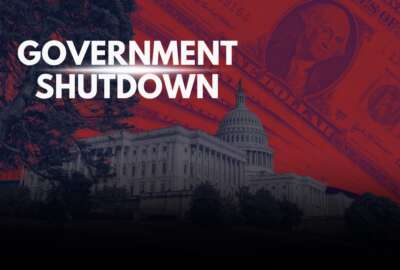National security will require a continuing supply of national security talent
"Our idea for this program, the Future Strategist program, is really to help students get involved in national security, broadly understood," said Jeff Rogg.
Like every critical issue facing the nation, national security will require gifted people who care about it. To help, the University of South Florida has launched a comprehensive program to prepare students interested in a national security career. The program coordinator, Jeff Rogg joined the Federal Drive with Tom Temin with more details.
Interview transcript:
Tom Temin Let’s define national security. In other words, this is for people that aren’t pursuing a military career. That’s one component of national security. But there’s this gigantic apparatus otherwise.
Jeff Rogg Yeah, that’s right. And I’m glad you said that, because I think the perception is for college students, especially as when you say National Security, they think military perhaps first and foremost, and then maybe some of them think Intelligence Community, law enforcement. But at the Global and National Security Institute at University of South Florida (GNSI). We’re really talking about national security in the broadest sense. And that’s actually a trend that I think national security practitioners themselves are doing. It’s very popular to discuss within national security circles about whole of government approaches to national security challenges, but we are increasingly discussing all of nation approaches. And so our idea for this program, the Future Strategist program, is really to help students get involved in national security, broadly understood. So even beyond law enforcement, intelligence, diplomacy and the military, USAID developmental programs, economic programs, all of these touch on national security.
Tom Temin Okay. Then what do you focus on in terms of what they need to know? Because that’s a huge range of skills and requirements. And if you’re going to be a diplomat and you want to join the Foreign Service, that’s very different than, say, administering contracts with NGOs in some strange country for USAID.
Jeff Rogg Yes, it is. And one of the fascinating points is the students themselves are bringing new approaches, even when it comes to technology, sometimes the students are more technologically savvy than we are. I think we can all relate to that as we get older. And so it’s really the students who are bringing a new look on these subjects themselves. What we’re providing is the networks and the connectivity, the awareness about the different potential fields in national security. And again, whether the students have their own degree programs, whether they’re in a political science program, looking at law as a field data scientists or computer scientists. So they’re already dreamed that what we’re doing is we’re helping them with the awareness of the different job opportunities, applications for internships, graduate school or careers, and then other things like resume writing for USAjobs is extremely important because that’s your first access point.
Tom Temin And are you thinking in terms or are they thinking in terms of primarily federal jobs? Because there’s not much outside of federal really that relates to national security?
Jeff Rogg Well state and local, when we saw this recently, I’m speaking to you from Tampa, Florida, with the hurricanes, but state and local touch directly upon national security. At the at the end of the day, national security, when I talk to friends, family, citizens, in other words, people outside of the actual national security fields, national security is things like food security, security from environmental disasters. And so I do think it’s even broader than the federal networks. State and local agencies, international organizations. To me, this is all U.S. national security in the 21st century.
Tom Temin And I guess you could also throw in some of the contracting community. There’s a lot of companies that support federal and state and local efforts at national security. In fact, they probably outnumber the governmentally employed people by a factor of ten.
Jeff Rogg You’re exactly right, Tom. And that’s another huge point for our students, where college students these days and, I say this having been a professor, now I’m a senior research fellow, so the job’s a little bit different. But I’m working with students and they’re concerned about jobs and the future. And national security, again, just even outside of the federal government is enormous as far as job opportunities for students. And so contractors, for instance, as you mentioned, how many different contractors are there across the national security space? How much money is there for students, not just in terms of income, but students who are looking to pay off school loans, undergrad and graduate loans. And so this touches upon something that every college or university student is concerned about, which is, okay, I’m getting a degree, then what?
Tom Temin We were speaking with Jeff Rogg. He is program coordinator and senior research fellow of the Global and National Security Institute, part of the University of Florida. And another overlooked area, I think sometimes by the academic setting and not that generally known to the student population is Defense Department Civilian Employment. And you see some brilliant people doing work that never had a military career, but they do great work in support of the military as civilians. Does that figure in also?
Jeff Rogg Absolutely. I say that having been a DoD civilian myself on the academic side, yes. But I was interacting with people who were DoD civilians and even, again, outside of just the military, you have civilian in the sense of academics or people who are subject matter specialists across government, and even beyond that, think tanks, for instance. Think tanks, nonprofits, NGOs, this is all the broader field of national security. And so that goes back to just the accessibility that students need. They need to understand that all of these are potential inroads for them into national security careers. Aside from, well, I’ll be a diplomat, I’ll be a spy, I’ll be a military officer.
Tom Temin Right, sure. And I wanted to ask you your assessment of the students of today. And that’s a pretty vague term, I admit. But to be desirous of working in national security, you need to have, I would think, some degree of patriotism, and kind of love of country. And that seems almost passé. But do you find that evident in the students pursuing this type of career?
Jeff Rogg Absolutely, 100%. The student enthusiasm for this program so far has been overwhelming. And having taught college students, undergraduate students, for instance, at the Citadel in South Carolina, I actually have gotten to see this generation that maybe it’s just popular to say, Well, this generation isn’t as patriotic or this generation isn’t as attuned to the world today. I haven’t found that to be the case actually. I found them to be keenly interested in it. Now, we do have issues that all of us know and talk about with things like sources of information, disinformation, where you get your news as a social media, is it from legacy media? These are broader educational issues. But as far as the students and their interest in the world, they’re interested in their jobs and how they’re going to contribute. And finding meaning with it. I don’t see that being different than any other generation. My peers and colleagues, older friends and mentors who went into national security fields for patriotic reasons and to find personal meaning.
Tom Temin All right. And how does this work operationally? Who teaches? Do you have special courses? Because you said the students are already in other majors. For example, do you have people practicing national security from agencies come in as guest lecturers, that kind of thing?
Jeff Rogg Yes. And so fortunately, GNSI has a deep bench of nonresident fellows who represent a entire spectrum of national security careers and at different levels, too, with a lot of experience, decades of experience. And so what we’re working with the students on is giving them access to these fellows. We’re going to actually put on a national security careers panel tonight. And that’s for the entire campus, not just for our program. Again, just to provide touch points for these students to understand the different careers that are out there. But beyond that, another colleague of mine, Dave Oakley, who’s our academic director at GNSI and I are developing a course on elements of American statecraft, because you’re right in identifying that there do need to be educational courses within universities and colleges to prepare students for these careers, and not just extracurricular programs like our program.
Tom Temin And do you find that students across the political bias spectrum are interested in national security?
Jeff Rogg Yes, definitely. And the political bias thing, and I’m coming at this from my academic area of expertise is intelligence studies, and particularly the American intelligence system and U.S. intelligence community. And one of the salient points that I take from my research is the need to be nonpartisan in national security. And so that’s something that I emphasize with the students. And I think it’s, you already are attuned to it with your question. But I think it’s something important to re-instill not just in the students and academic institutions, but also in the professors and mentors, is, you can have your political opinions, but when it comes to things like national security, you have to be nonpartisan in how you approach them.
Copyright © 2024 Federal News Network. All rights reserved. This website is not intended for users located within the European Economic Area.
Tom Temin is host of the Federal Drive and has been providing insight on federal technology and management issues for more than 30 years.
Follow @tteminWFED






